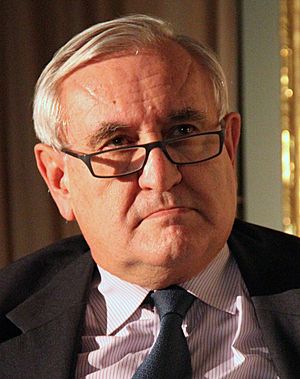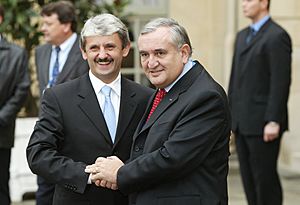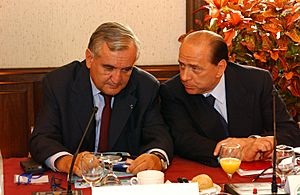Jean-Pierre Raffarin facts for kids
Quick facts for kids
Jean-Pierre Raffarin
|
|
|---|---|

Raffarin in 2013
|
|
| Prime Minister of France | |
| In office 6 May 2002 – 31 May 2005 |
|
| President | Jacques Chirac |
| Preceded by | Lionel Jospin |
| Succeeded by | Dominique de Villepin |
| Member of the Senate | |
| In office 18 September 2005 – 4 October 2017 |
|
| Constituency | Vienne |
| In office 1 October 2004 – 1 November 2004 |
|
| Constituency | Vienne |
| In office 21 September 1997 – 6 June 2002 |
|
| Constituency | Vienne |
| In office 2 October 1995 – 31 October 1995 |
|
| Constituency | Vienne |
| Minister of Small and Medium Enterprises, Commerce and Crafts | |
| In office 18 May 1995 – 4 June 1997 |
|
| Prime Minister | Alain Juppé |
| Preceded by | Alain Madelin |
| Succeeded by | Marylise Lebranchu |
| Member of the European Parliament | |
| In office 25 July 1989 – 18 May 1995 |
|
| Constituency | France |
| President of the Regional Council of Poitou-Charentes | |
| In office 19 December 1988 – 8 May 2002 |
|
| Preceded by | Louis Fruchard |
| Succeeded by | Élisabeth Morin |
| Personal details | |
| Born | 3 August 1948 Poitiers, France |
| Political party | The Republicans (2015–present) |
| Other political affiliations |
Liberal Democracy (before 2002) UMP (2002–2015) |
| Spouse |
Anne-Marie Perrier
(m. 1980) |
| Children | 2 |
| Alma mater | Panthéon-Assas University ESCP Business School |
Jean-Pierre Raffarin (born 3 August 1948) is a French politician. He was the Prime Minister of France from May 2002 to May 2005. He served under President Jacques Chirac.
Raffarin left his job as prime minister after French voters said "no" in a special vote, called a referendum. The vote was about a new constitution for the European Union. After he left, polls showed that many people were not happy with his work. This made him one of the least popular prime ministers in modern French history.
Despite this, some writers said he was actually a "remarkably popular Prime Minister" for a time. He was also the Vice President of the French Senate from 2011 to 2014.
Contents
Early Life and Education
Jean-Pierre Raffarin was born in the city of Poitiers, France. His father, Jean Raffarin, was also a politician and served as a government minister in the 1950s.
Raffarin went to college to study law at Université Paris-Panthéon-Assas. He also graduated from a top business school, the École Supérieure de Commerce de Paris. After finishing his studies, he began working in marketing.
In the 1970s, he became interested in politics. He joined a group that supported the French president at the time, Valéry Giscard d'Estaing. He later joined the Republican Party, which was a center-right political party in France.
Political Career
In the 1980s, Raffarin began his political career in his home region of Poitou-Charentes. He became the president of the regional council in 1988. A few years later, in 1995, he was elected as a senator, representing the Vienne area in the French Senate.
During the 1995 presidential election, he supported Jacques Chirac, who won. As a reward, Chirac made him the Minister of Small and Medium-sized Companies, Commerce and Craft Industry. He held this job from 1995 to 1997.
Raffarin helped create a new political party called the Union for a Popular Movement (UMP). He believed that all the parties on the right side of politics should unite behind President Chirac.
Time as Prime Minister


After President Chirac was re-elected in 2002, he chose Raffarin to be the new prime minister. As prime minister, Raffarin's government made several big changes.
In 2003, his government changed the rules for how people get money from the government after they retire. These changes led to many workers going on strike to protest. That same summer, a major heat wave in France caused the deaths of about 15,000 people. Many people felt the government did not act fast enough to help, and they blamed Raffarin's administration.
In 2004, he started a reform of France's healthcare system. His government was also known for having ministers who would argue with each other in public. Some people in the media made fun of Raffarin, saying he was not a strong enough leader.
Leaving the Job
In March 2004, Raffarin's UMP party did very poorly in local elections. This was seen as a sign that voters were unhappy with the government. Raffarin offered to resign, but President Chirac asked him to stay and form a new government.
A year later, in May 2005, the French people voted "no" in a referendum on a new constitution for the European Union. After this defeat, Raffarin resigned for good. He was replaced as prime minister by Dominique de Villepin.
Later Career
After leaving his post as prime minister, Raffarin was elected to the French Senate in September 2005. He continued to be an important member of the UMP party and served as one of its vice presidents. He retired from the Senate in 2017.
Raffarinades
Raffarin was famous for his unique and often optimistic sayings. People called these sayings raffarinades. One of his most famous lines was, "La route est droite, mais la pente est forte" which means, "The road is straight, but the slope is steep."
He once tried to give a speech in English about the European Constitution vote. He said: "Win the yes needs the no to win against the no." This confusing sentence was widely reported in the media.
Honours
Raffarin has received several awards for his public service.
| Ribbon bar | Honour | Country | Date |
|---|---|---|---|
| Grand Officer of the Legion of Honour | France | 2008 | |
| Grand Cross of the National Order of Merit | France | 2002 | |
| Knight of the National Order of Quebec | Canada | 2003 | |
| Grand Cross of the Order of the Star of Romania | Romania | 2004 | |
| Order of Friendship | China | 2019 |
See also
 In Spanish: Jean-Pierre Raffarin para niños
In Spanish: Jean-Pierre Raffarin para niños
- List of prime ministers of France
- Politics of France
 | Jackie Robinson |
 | Jack Johnson |
 | Althea Gibson |
 | Arthur Ashe |
 | Muhammad Ali |

